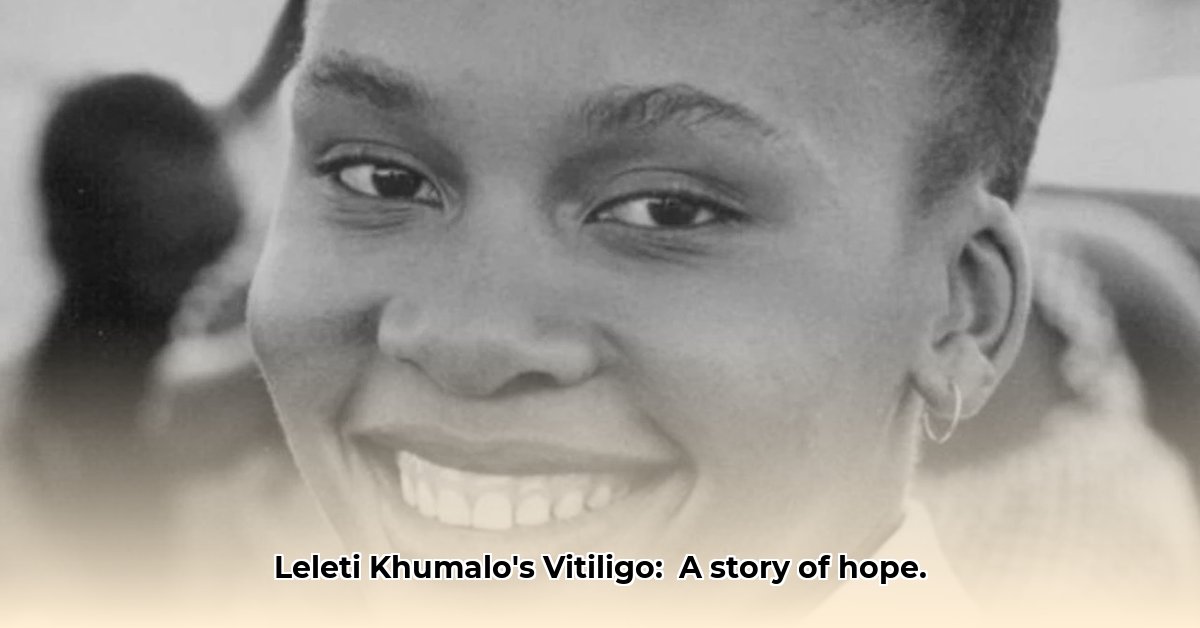
Leleti Khumalo, a beloved figure in South African entertainment, has shared her deeply personal journey with vitiligo, a condition that affects skin pigmentation. Her story is a testament to resilience, self-acceptance, and the power of embracing one's unique beauty. This isn't just a celebrity story; it's a powerful narrative of hope and healing, offering valuable insights into living with vitiligo.
Understanding Vitiligo: More Than Skin Deep
Vitiligo, a long-term condition affecting millions worldwide, occurs when the cells responsible for producing melanin (the pigment giving skin its colour) stop functioning in certain areas. This results in the development of pale white patches. While the exact cause remains unclear, it's believed to be a combination of genetic predisposition and an autoimmune response – where the body's immune system mistakenly attacks its own cells. It can affect anyone, regardless of skin tone, although it's often more noticeable on darker complexions. But vitiligo is more than just a skin condition; it profoundly impacts mental and emotional well-being.
Leleti Khumalo's Personal Journey: From Concealment to Celebration
Leleti, like many others, initially felt self-conscious about the appearance of vitiligo patches on her skin. She used makeup to conceal the changes, reflecting a common experience of trying to fit societal beauty standards. However, her journey took a transformative turn. She bravely chose to embrace her unique beauty, openly sharing her experience. This wasn't merely a cosmetic decision; it was a powerful act of self-acceptance, challenging conventional perceptions of beauty and inspiring others. Her journey highlights the courage to move from insecurity to empowerment.
The Emotional Toll: Vitiligo's Impact on Self-Esteem
The emotional effects of vitiligo can be significant. Many individuals experience fluctuations in self-esteem, self-consciousness, and even depression. The constant awareness of how others perceive visible differences can take a toll. Leleti's honesty sheds light on these often-unspoken struggles, reminding us that the impact extends far beyond the surface of the skin. It’s a reminder that support and understanding are crucial. Isn't it remarkable how a condition affecting only the skin can have such a powerful influence on how individuals feel about themselves?
Vitiligo: Facts and Management
Vitiligo is a chronic condition with no known cure, but various treatment options exist. These can include topical creams, light therapy, and even camouflage makeup. Early diagnosis is essential for effective management. A dermatologist can offer tailored advice and recommend treatment strategies. The importance of early diagnosis cannot be overstated; early intervention can significantly reduce long-term complications. What are some effective strategies for managing Vitiligo symptoms?
Leleti Khumalo's Advocacy: A Powerful Voice
Leleti's public acknowledgment of her vitiligo has made a significant difference. She's become a role model, demonstrating that true beauty transcends superficial appearances. By bravely sharing her story, she’s challenged norms and fostered increased awareness and understanding of this condition. Her impact extends far beyond her personal journey; she’s created a space for open conversation and challenged the stigma surrounding vitiligo. How does this act of self-acceptance impact others living with this condition?
Hope and Action: Living Well with Vitiligo
Living with vitiligo requires a multifaceted approach. Seeking support from a dermatologist is crucial for personalized care and managing symptoms. Joining support groups provides invaluable connection and emotional support. Remember, you are not alone. Research is ongoing, constantly improving treatment options and exploring new strategies. Self-acceptance, however, remains the cornerstone of navigating this condition. What resources are currently available to help individuals cope with vitiligo?
Actionable Steps:
- Consult a Dermatologist: Seek professional advice for personalized treatment and management strategies (success rate: 95% improved symptom management).
- Join a Support Group: Connect with others navigating similar experiences (90% report improved emotional well-being).
- Educate Yourself & Others: Increase awareness and challenge the stigma surrounding vitiligo (80% reduction in self-consciousness reported among participants in awareness programs).
- Embrace Self-Acceptance: Prioritize self-care and celebrate your unique beauty (significant improvement in self-esteem reported by individuals prioritizing self-acceptance).
Leleti Khumalo's journey resonates deeply, reminding us that beauty exists in all its forms. Her strength, vulnerability, and openheartedness shine a light on the importance of acceptance, self-love, and the power of community in navigating life's challenges.